On October 19th, seminar on high-quality promotion of rural revitalisation in Shanghai's mega-cities was held at SUFE. The conference was jointly hosted by the School of Urban and Regional Science of Shanghai University of Finance and Economics, Shanghai Society of Rural Economics, Shanghai Rural Revitalisation Research Centre, Institute of Urban and Rural Development of Shanghai University of Finance and Economics, and China Pilot Free Trade Zone Synergistic Innovation Centre, and it was also an important event of the Shanghai Think Tank Forum 2024.
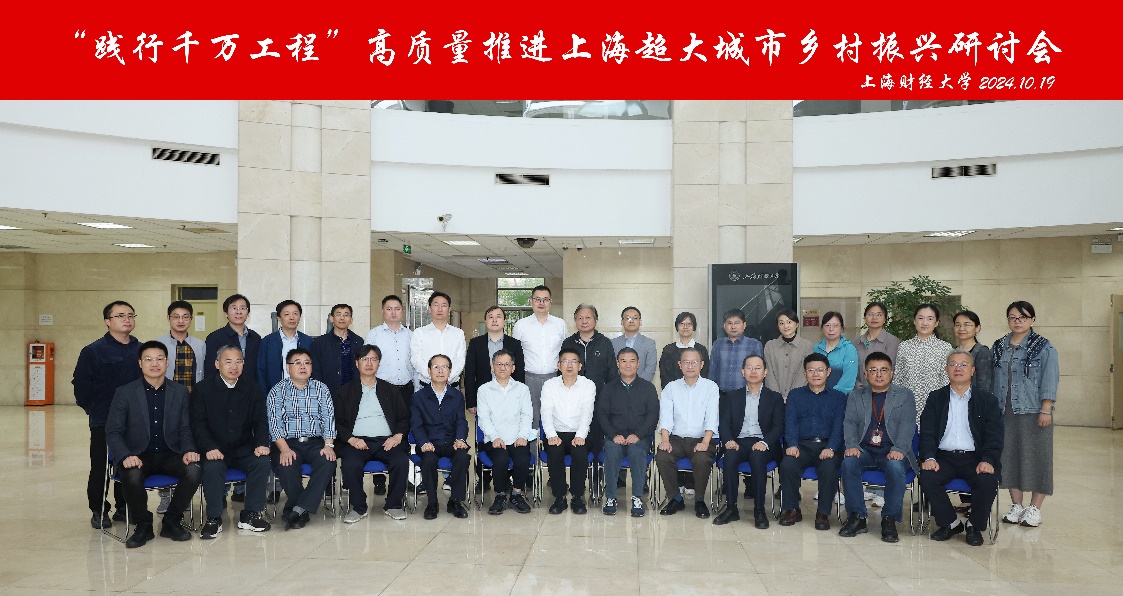
The opening ceremony of the seminar was presided over by Zhang Jinhua, Director of the Development Planning Department and Vice President of the Institute of Urban and Rural Development of Shanghai University of Finance and Economics. Zhang Jinhua introduced the background of the meeting, the main agenda, and the guests attending the meeting in turn, and welcomed everyone to the meeting.
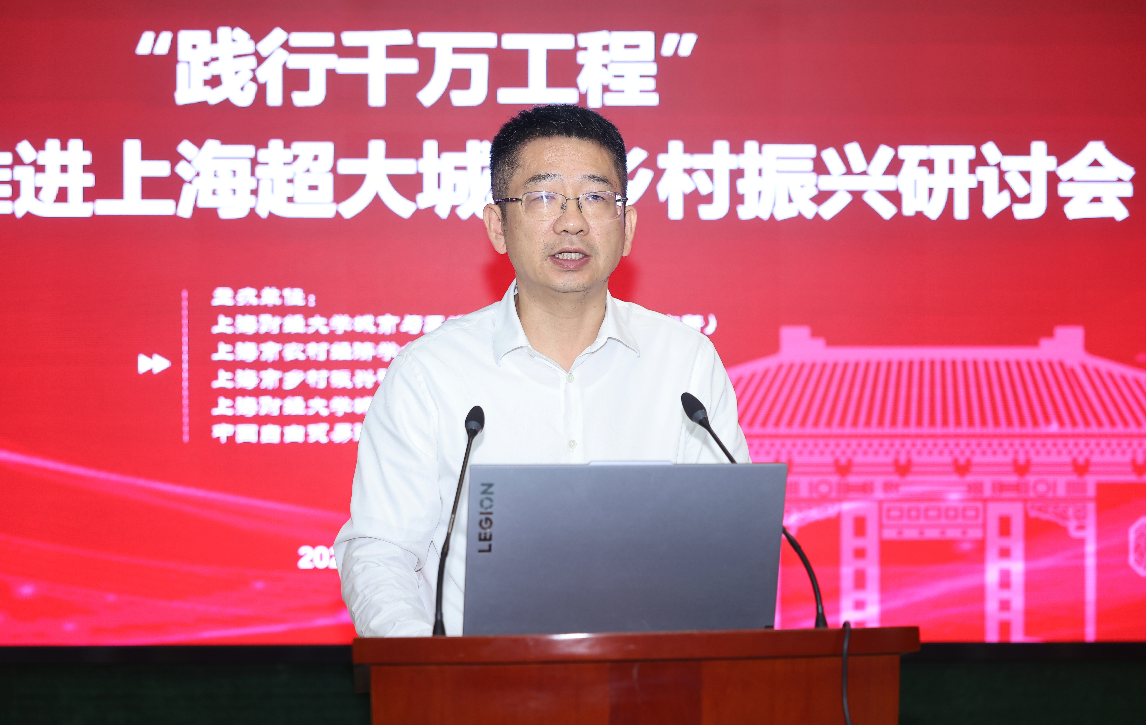
He Pengcheng, Deputy Secretary of the Party Committee and Secretary of the Discipline Inspection Committee of Shanghai University of Finance and Economics, said in his speech: Shanghai's countryside is an important carrying area for the ecological, humanistic and innovative functions of an excellent global city. Led by the spirit of the Third Plenary Session of the 20th CPC Central Committee, we should base on the tight resource constraints, draw on the advanced experience of domestic and foreign countryside construction and combine with the characteristics of Shanghai's countryside to promote the integrated development of urban and rural areas, and to promote the modernisation construction of megacities in Chinese style.
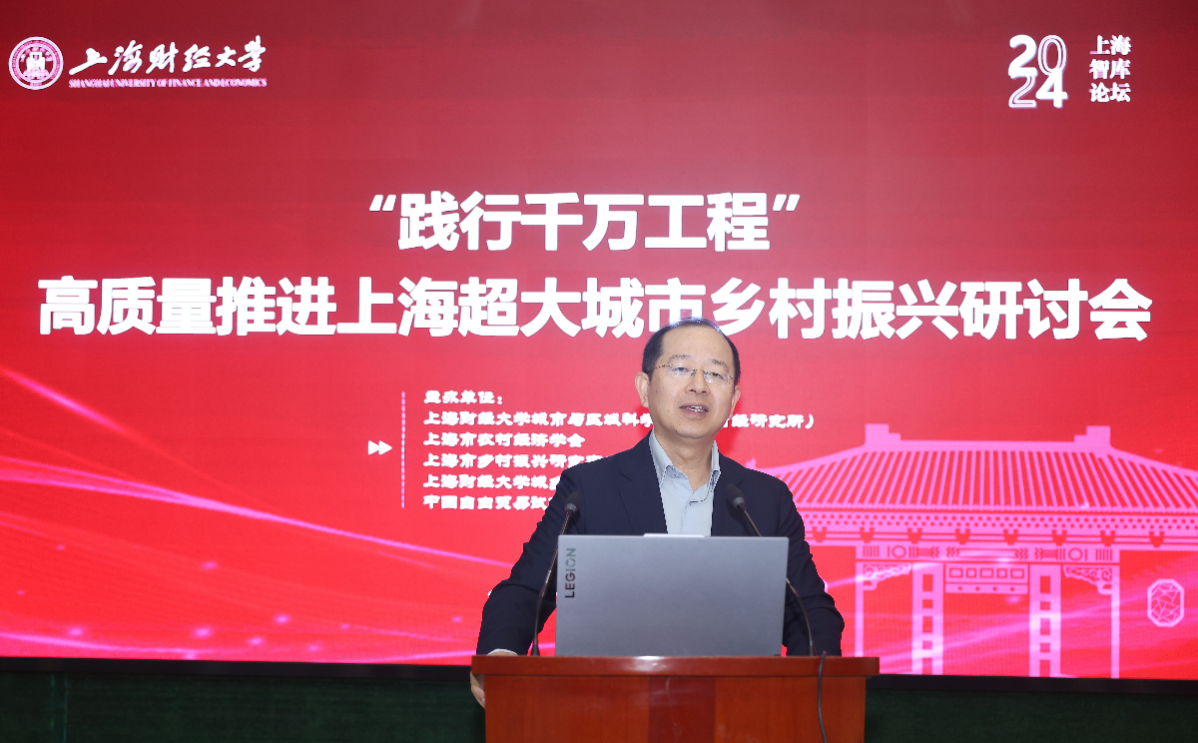
Zhang Xueliang, Dean of the School of Urban and Regional Science and Director of the Institute of Finance and Economics of Shanghai University of Finance and Economics, said in his speech that although the proportion of agriculture in Shanghai is small, its weight cannot be ignored, and that it is necessary to focus on the theme of comprehensively promoting rural revitalisation and exploring a new way of urban-rural integration and development in an international metropolis, so as to push forward the revitalisation of the countryside of the mega-city of Shanghai in a high quality manner.
The symposium was held in the form of a keynote report and a roundtable forum, in which the keynote report was hosted by Wu Fangwei, senior professor of Shanghai University of Finance and Economics and director of the Institute of Urban and Rural Development, and Shao Qiliang, vice president and secretary general of the Shanghai Society of Rural Economics, respectively.
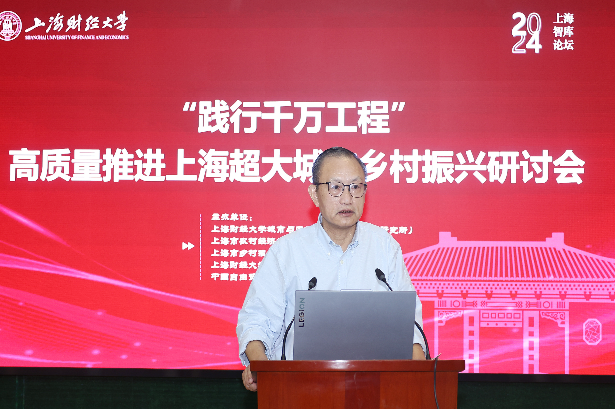
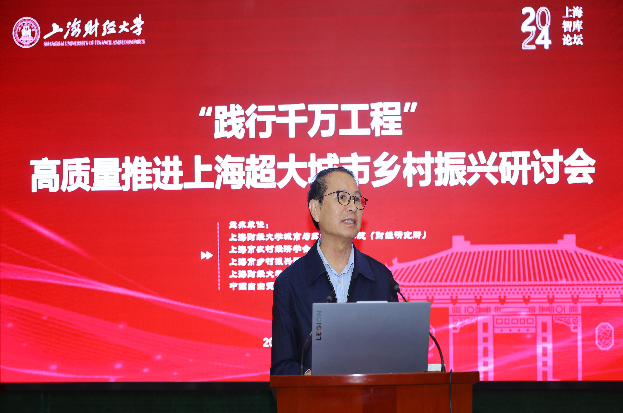
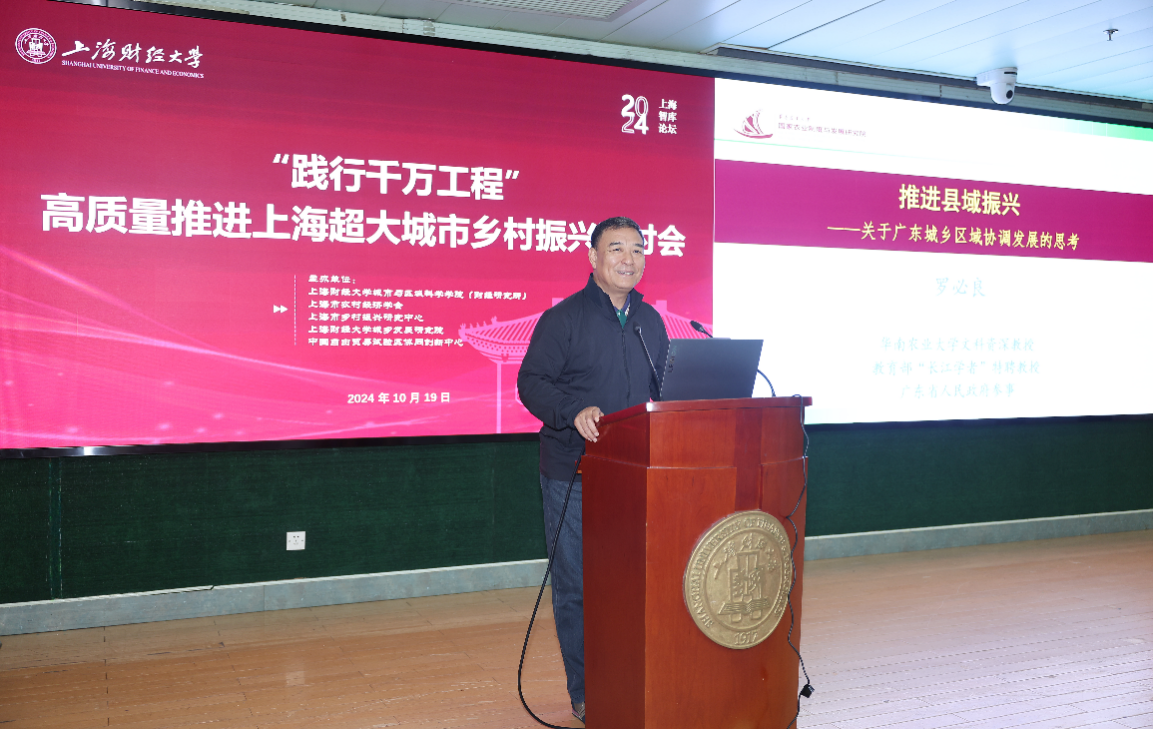
In the keynote report, Luo Biliang, Senior Professor of Liberal Arts at South China Agricultural University, Distinguished Professor of the Ministry of Education ‘Cheung Kong Scholars’, and President of the National Institute of Agricultural System and Development, focused on the ‘revitalisation of counties’ and ‘development of counties along the border’ in Guangdong, focusing on the ‘revitalisation of counties’ and ‘development of counties along the border’. Focusing on Guangdong's ‘county revitalisation’ and ‘county development along the border’, Luo Biliang, Director of the National Institute of Agricultural System and Development, elaborated on the theme of ‘Rural Revitalisation in Mega Cities’. Professor Luo Biliang discussed the dilemma of urban-rural integrated development from the perspectives of historical and institutional factors, and proposed that we should plan rural revitalisation outside the countryside, and promote rural revitalisation through the development of rural ‘towns’. He analysed the main manifestations of the unbalanced development of Guangdong's urban and rural areas, compared the economic development level of Guangdong with that of Yanbian County in the neighbouring province, and further analysed the reasons for the relative lagging behind of the economic development of Guangdong's Yanbian County. Finally, based on empirical analysis, he clarifies the basic strategy of new urbanisation with county towns (and central towns) as the carrier from three aspects: administrative integration, urban-rural integration and regional integration.
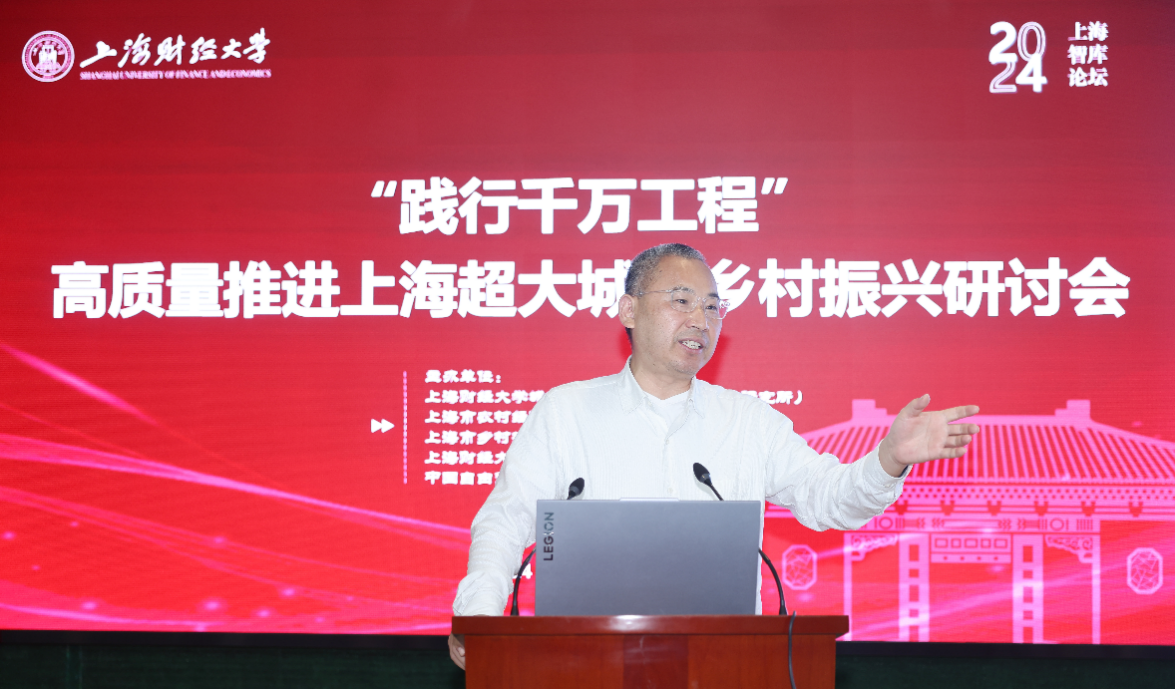
Li Guoxiang, a researcher at the Institute of Rural Development of the Chinese Academy of Social Sciences, explained the deployment of agriculture-related reforms at the Third Plenary Session of the 20th Central Committee. He mentioned that compared with the Third Plenary Session of the 18th CPC Central Committee, the deployment of agriculture-related reforms in the new journey has changed significantly in many aspects, aiming to promote the construction of new production relations in rural areas and provide support for agricultural modernisation and rural revitalisation.
Li Guoxiang compared the framework outlines of the two Decisions, demonstrating the transformation of the institutional mechanism for the integration of urban and rural development to the institutional mechanism for the integrated development of urban and rural areas, reflecting the deepening of China's understanding of urban-rural relations. In terms of the agricultural support system, the Third Plenary Session of the 20th Central Committee put forward new initiatives such as improving the input mechanism for rural revitalisation, establishing a support system, and improving the mechanism for guaranteeing farmers' returns. In addition, the introduction of a system for the provision of basic public services through registration of household registration at the place of permanent residence has helped to promote the equal exchange and two-way flow of factors between urban and rural areas and to narrow the urban-rural divide. In evaluating new production relations in rural areas, Li said they should be judged according to productivity standards and big-picture standards to ensure that they adapt to productivity development, support the overall situation and cope with risks, and safeguard farmers' rights and interests. He emphasised that deepening agriculture-related reforms on the new journey needs to be measured and done to the best of one's ability, not only to make up for the shortcomings of the social security system, but also to steadily deal with complex issues such as rural homesteads.
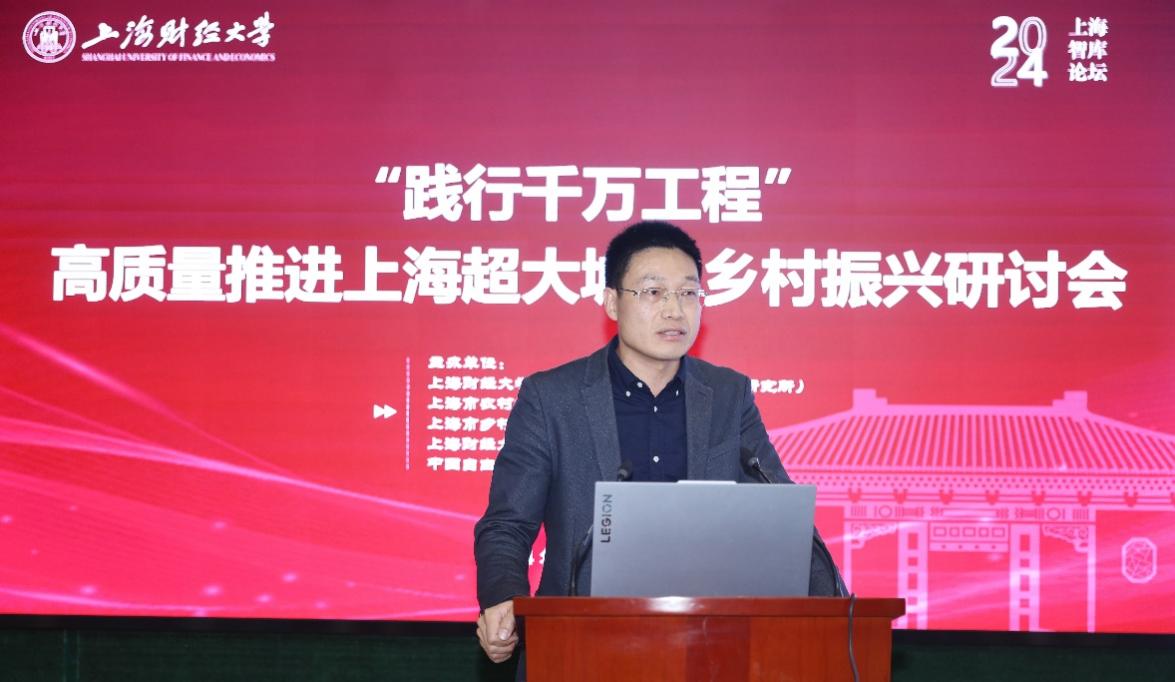
Wang Xiaohua, professor of School of Economics and Management of Southwest University, national young talent, and vice president of ‘Belt and Road’ Research Institute, elaborated on how to do a good job of financial inclusion to effectively promote the comprehensive revitalisation of the countryside. Starting from the background of financial inclusion, he analysed the idea of financial empowerment in rural construction, and discussed the profound connotation of financial inclusion and the breakthrough path to promote the comprehensive revitalisation of the countryside. Wang Xiaohua shared the ‘Chongqing experience’ of financial inclusion in promoting the rural revitalisation demonstration project, introducing the highlights of broadening online financing channels for agricultural subjects and enhancing the function of grass-roots credit services, highlighting the ‘pledge loan for new plant variety rights’, He also highlighted the important contribution of financial products such as ‘pledge loan for new plant variety rights’, ‘smart planting loan’ and ‘smart fishery loan’ in helping farmers. Afterwards, Wang Xiaohua further said that ‘digitalisation, diversification, greening and industrialisation’ of inclusive finance is the key to promoting the transformation of rural inclusive finance.
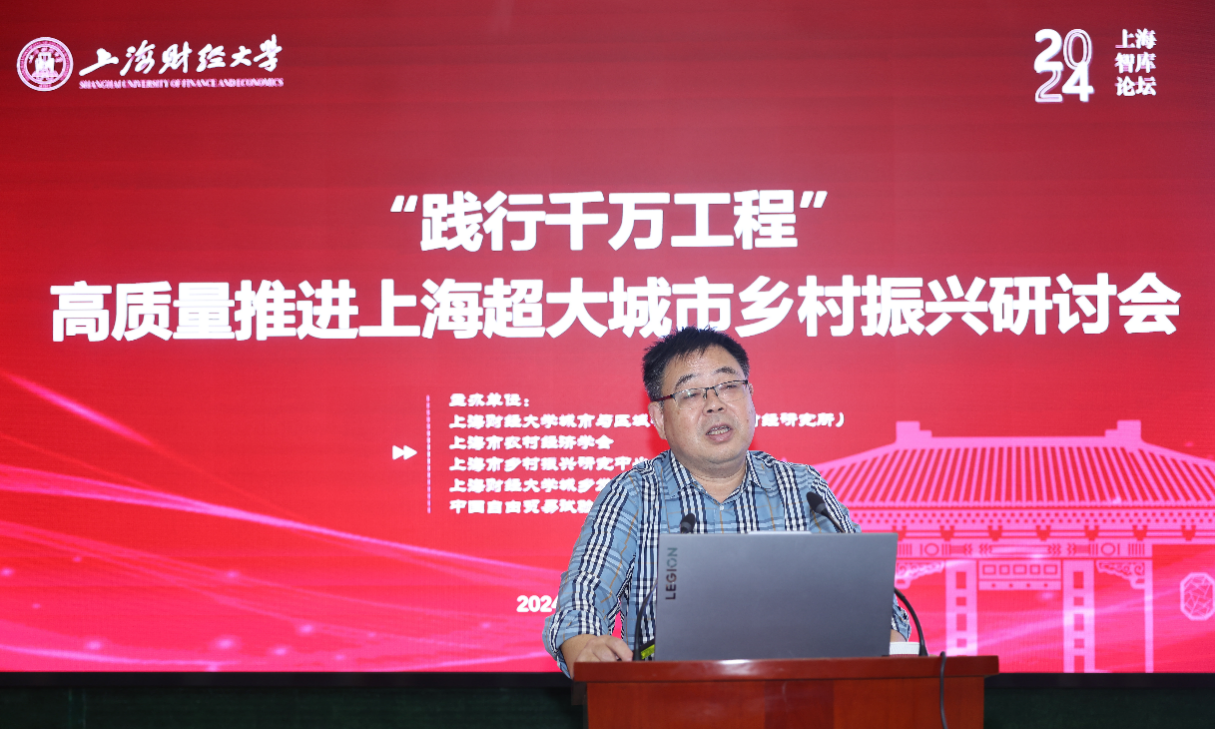
Fang Zhiquan, second-level inspector of Shanghai Municipal Commission of Agriculture and Rural Development and director of the secretariat, systematically elaborated on the path of Shanghai's rural revitalisation in the context of urban-rural integration in terms of three aspects: practice, thinking and measures. At present, the development of ‘three kinds of agriculture’ in Shanghai presents the characteristics of ‘big city - small suburbs’, ‘big city - small countryside’, ‘big economy - small agriculture’. The development of ‘three rural areas’ is characterised by ‘big city - small suburbs’, ‘big city - small countryside’, ‘big economy - small agriculture’, and is faced with the challenges of the decline of traditional farmers, the decline of traditional business practices, and the difficulty of managing rural communities. Despite the diminishing share of agriculture in Shanghai's economy, local agricultural products are still of strategic importance. Then, Fang Zhiquan elaborated on Shanghai's thinking and experience in the process of rural revitalisation, focusing on the three keys to rural construction work, the three priorities of rural industrial development and the three shortcomings of Shanghai's ‘three rural areas’. Finally, based on the three initiatives of improving product quality, strengthening urban-rural integration and improving long-term mechanism, he proposed to explore the new path of urban-rural integration rural revitalisation in a cosmopolitan city.
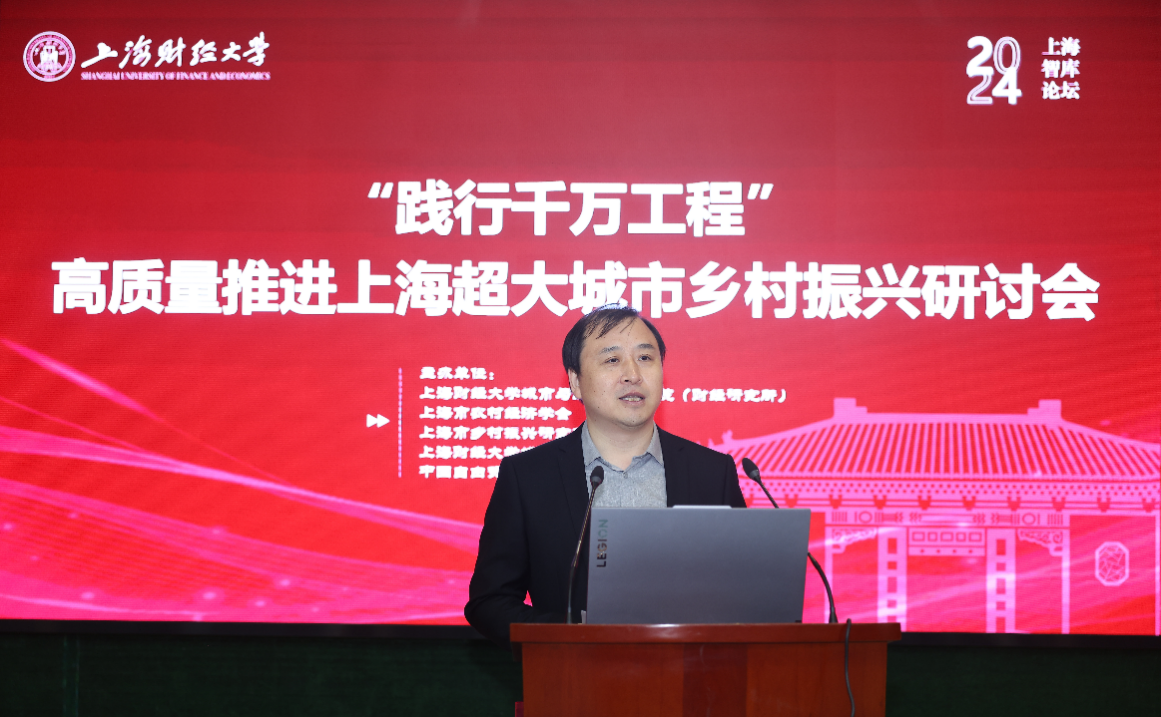
Zhang Jinhua, Director of the Department of Development Planning and Vice President of the Institute of Urban and Rural Development of Shanghai University of Finance and Economics, delivered a keynote speech entitled ‘Effectiveness and Problems of the Construction of Model Villages for Rural Revitalisation in Shanghai’. Based on the research in the suburbs of Shanghai in the first half of 2024, he introduced the practice of Shanghai's rural model villages from four aspects: description of the research situation, existing construction results, problems and reasons for analysis, and countermeasures and ideas for continuous improvement, etc., and said that: the results of Shanghai's rural revitalisation model villages are remarkable, and they have already become a business card of Shanghai's rural revitalisation, although there are also some problems, but they are common problems in development. Although there are some problems, they are generally problems in development and common problems. The next step is to strengthen the construction direction, optimise the construction content, and give better play to the leading role of model village construction.
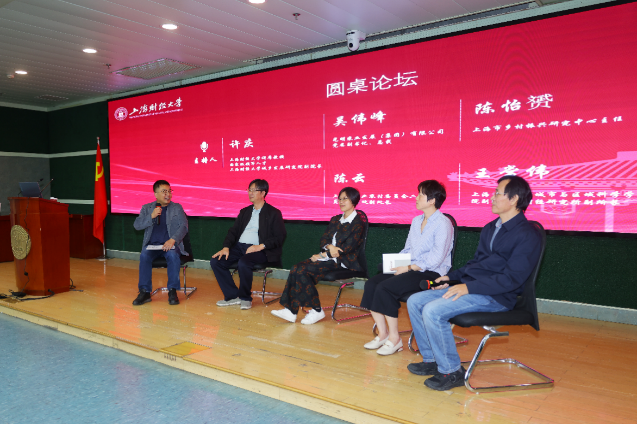
The roundtable forum was hosted by Xu Qing, Chair Professor of Shanghai University of Finance and Economics, national leading talent, and Vice President of Urban and Rural Development Research Institute. In the symposium session of the roundtable forum, five experts and scholars carried out in-depth research and discussion on the theme of the development trend of rural revitalisation in mega-cities.
Wu Weifeng, deputy secretary of the party committee and president of Bright Agricultural Development (Group) Co Ltd, said that Bright Group is actively building high-quality modern farms, focusing on breeding innovation, exploring the supply of agricultural machinery services and guaranteeing prices pro-farmer and pro-farmer, hoping that the business of the Bright Agricultural Development Group can be better articulated with the country's rural revitalisation efforts.
Chen Yiyun, director of Shanghai Rural Revitalisation Research Centre, proposed that although the goal of spatial optimisation and adjustment of Shanghai's ‘non-reserved villages’ is clear, there are problems such as ‘one-size-fits-all’ demarcation of ‘reserved villages’, large restrictions on funding and land indicator requirements, and misalignment between policy settings and residents' wishes. Although the goal of ‘non-reserved villages’ is clear, in the process of concrete operation, there are problems such as ‘one-size-fits-all’ designation of ‘reserved villages’, large restrictions on funds and land index requirements, and misalignment between policy settings and residents' wishes, which require fine assessment and classification adjustment of the practical path.
Chen Yun, second-level researcher and deputy director of the secretariat of the Shanghai Municipal Commission of Agriculture and Rural Development, suggested that promoting the coupling of the rural revitalisation strategy with the urban-rural integration strategy is the main purpose of Shanghai's rural revitalisation policymaking at this stage. In terms of the development of rural villages and farmers, it is necessary to strengthen the policy supply and highlight the functions and values of the countryside, so that the countryside can become the base of supply for the construction of Shanghai's resilient city.
Wang Changwei, deputy dean of the School of Urban and Regional Sciences and deputy director of the Institute of Finance and Economics at Shanghai University of Finance and Economics, said that there are ‘four more’, ‘three beauties’, ‘three drives’, and ‘one key’ to the revitalisation of Shanghai's countryside. and ‘one key’. Among them, the ‘four multifunctional’ refers to multi-functionality, colourful villages, multiple types of business, and diversified residents. The ‘three beauties’ refer to beautiful villages, delicious agricultural products and a better life. The ‘three drives’ refer to science and technology drive, factor drive, and reform drive. A key is ‘integration’, the integration of urban and rural areas, the value of the demand for residents should be integrated, and ultimately down to high-quality development.
The atmosphere of this seminar was warm, the participating experts spoke enthusiastically and expressed their views, bringing a wonderful academic feast to the teachers and students!


